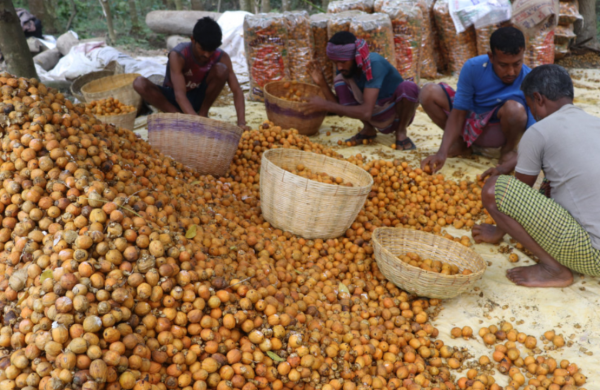Dhope method transforming betel nut storage in Pirojpur
- Update Time : Friday, December 27, 2024

Pirojpur Correspondent
In Pirojpur, betel nut preservation has long been dominated by the traditional sun-drying method. However, over the last decade, a new technique known locally as the “dhope” method has gained popularity among businessmen, offering a unique way to store and market betel nuts.
The dhope method involves submerging betel nuts in water to preserve their freshness and enhance their market appeal. Businessmen begin by purchasing ripe, high-quality betel nuts from local markets. The nuts are then packed into large bags made by stitching together 21 plastic sacks, typically used for poultry feed. These “dhopes” can hold up to 200,000 betel nuts each and are submerged in water bodies such as abandoned ponds.
After two to three months, the nuts are retrieved, cleaned, and packaged into sacks, each holding 2,000 nuts, ready for sale to wholesale buyers. This practice, reportedly adopted from Noakhali, has been used in Pirojpur for over 15 years and has become especially popular in the past decade.
The wet betel nuts preserved through the dhope system are highly sought after for their fresh taste, which is prized across the country, said Helal Uddin, a trader from Pattashi village in Indurkani upazila. “The wet betel nuts offer the real taste of raw betel nuts and have a special demand in markets nationwide.”
He said he sells his wet betel nuts to wholesale markets in regions such as Rangpur, Gaibandha, Nilphamari, and Dinajpur. The trade is typically active for four to six months each year, depending on market demand.
“We can make around double the profit compared to dry betel nuts,” said Liton Howlader, another trader from Pattashi village. He said careful selection of ripe betel nuts and meticulous maintenance of the dhope are critical to success.
The dhope system has also created employment opportunities for skilled workers who specialise in retrieving and packaging the betel nuts. Workers are paid approximately Tk 70 per sack for tasks such as collecting nuts from the water and loading them onto trucks.
“Working all day, we can earn around Tk 500-600,” says Abdul Barek Sheikh, a worker from Bagerhat’s Kachua upazila.
The increasing demand for betel nuts has also encouraged more farmers in Pirojpur to cultivate the crop. “Betel nut cultivation is far more profitable compared to other crops,” said Ashikur Rahman, a farmer.
Many farmers not only grow betel nuts but also store them using the dhope system to boost their earnings, he said.
According to the Directorate of Agricultural Extension (DAE) in Pirojpur, betel nuts were cultivated on 5,437 hectares of land this year.













